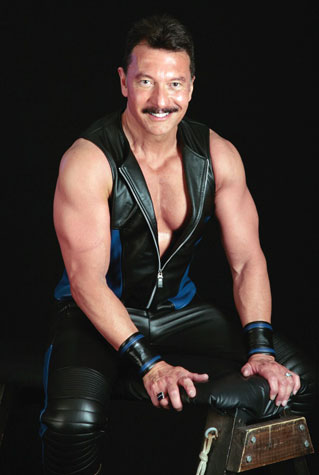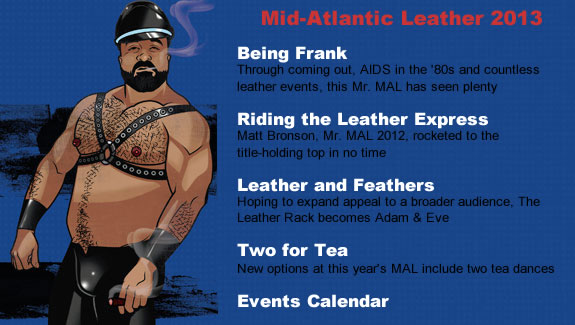Frank Nowicki says gay high school classmates of his still occasionally thank him for sticking up for them back then.
''I know you don't remember me,'' Nowicki recalls the not uncommon refrain, ''but you were so cool. When [jocks] used to pick on me, you used to kind of get in the way, prevent them from really harassing me.''
Nowicki, of course, was also gay – ''I probably knew I was gay in grade school,'' he laughs – but he was spared bullying while a student in the 1970s at his Catholic school in upper Northwest D.C., Archbishop Carroll High School. ''I was kind of like one of the popular people in my high school. I was friends with everybody,'' says Nowicki, who was active in a variety of things, from sports to drama to the honor society.

Frank Nowicki
(Photo by Ron Volanti / RJV Studios Chicago)
''You never know how you'll have an effect on somebody,'' he marvels as he recollects his many experiences. Certainly the 56-year-old has had a positive impact on many, from his high school's ''sissy boys'' – ''people didn't call people gay back then'' – to a great number of people he's interacted with ever since he officially came out at the first national gay-rights march, 1979's National March on Washington for Lesbian and Gay Rights. He was 21 at the time.
Twenty years ago Nowicki won the title of Mr. Mid-Atlantic Leather. Though he relinquished the title in 1994, he never really relinquished the stage. A natural in front of a crowd, the loquacious Nowicki has been the Mr. MAL contest's emcee pretty much ever since, and regularly serves as master of ceremonies for other leather events around the world.
''Frank's an icon,'' says Patrick Grady, chairman of the Mid-Atlantic Leather Weekend. ''But he's an icon who's also a very wonderful friend, so full of life. [He's] a sweetheart, very caring and giving. And he's so funny. It's such a privilege to have him in our community.''
Nowicki's community support goes beyond leather. Among other things, he also regularly serves as a judge for the Academy of Washington. In fact, he credits that storied local drag organization with essentially giving him the confidence and ease to take the stage. ''They used to put on huge shows [with] big production numbers,'' he says, ''[and] I used to sing a lot" [onstage]. ''The Academy has always been like a family to me, just like the leather community.''
Nowicki's actual family is part of the mix, too. He took his mother and a sister – just one of five younger siblings – to see the drag shows at the old Rogue nightclub the weekend after that first gay-rights march. His mom and dad aren't strangers to his leather community, either. In fact, his mother was in the audience when he won Mr. MAL. ''She was actually one of the first mothers that came around,'' he says. ''My mom's always been real, real cool.''
''I never had to sit down to my parents and say, 'Hey, Mom and Dad, I'm gay,''' Nowicki continues. ''It was just one of those things, 'Oh, he must be.' My parents embraced all my friends.''
Those friends included the couple Dick Cogan and Paul Criss, as well as Joe Henry, a popular drag queen with the Academy who performed under the name Marlo Thomas. Henry was among the first people Nowicki knew to die from complications related to AIDS. It was 1981. ''She started to lose all this weight, and she started to get these, like, splotches,'' he remembers. ''And people didn't know what anything was. We were just told, 'Oh, it's liver spots. It was a liver condition.'''
After relating memories of how devastating the AIDS crisis was as it hit three decades ago, Nowicki expresses concern about the younger gay generation. He can't recommend enough David Weissman and Bill Weber's powerful 2011 documentary We Were Here as a means to help them appreciate the impact that AIDS has had on the community. Nowicki is also afraid the younger set doesn't understand that it's not just a disease to be thought of in the past tense. ''Because of the drugs we have today, [they think] you take your pill or pills a day [and you're fine],'' he says. But ''the side effects of these drugs, and the psychological effects of being positive'' are strong reasons negative guys should still practice safer sex and strive to avoid seroconverting, he argues.
AIDS, of course, also helped propel the gay community to become stronger and more visible. ''It was a double-edged sword,'' admits Nowicki. He goes on to express amazement at how much progress the gay community has made in the 20 years since he was the reigning Mr. MAL.
''Now we have seven out LGBT members of Congress, and of course our first out U.S. senator, Tammy Baldwin,'' he beams. ''That's an amazing thing. The Victory Fund has been amazing, not just in the support, but the grooming of LGBT individuals that want to run for public office.''
But it wasn't the Gay & Lesbian Victory Fund alone that achieved that progress. Increased visibility in general has been critical, with more LGBT people standing up and giving back. ''When you give back, things come back tenfold,'' Nowicki reasons. ''Everybody has a gift to give back. You just have to look for what it is – whether it's volunteering, whether it's doing stuff up onstage like I do.''
Nowicki says we can expect to see him up onstage for another 20 years, and probably more. ''As anybody who's seen me up onstage knows, I have a good time up there,'' he says, adding, ''I'll always be a part of the community, on all levels.''
